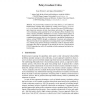473 search results - page 50 / 95 » Optimal policy switching algorithms for reinforcement learni... |
NECO
2007
13 years 8 months ago
2007
Learning agents, whether natural or artificial, must update their internal parameters in order to improve their behavior over time. In reinforcement learning, this plasticity is ...
ATAL
2005
Springer
14 years 2 months ago
2005
Springer
Mediation is the process of decomposing a task into subtasks, finding agents suitable for these subtasks and negotiating with agents to obtain commitments to execute these subtas...
AAAI
2010
13 years 10 months ago
2010
Embedded systems consisting of collaborating agents capable of interacting with their environment are becoming ubiquitous. It is crucial for these systems to be able to adapt to t...
ECML
2007
Springer
14 years 3 months ago
2007
Springer
We present Policy Gradient Actor-Critic (PGAC), a new model-free Reinforcement Learning (RL) method for creating limited-memory stochastic policies for Partially Observable Markov ...
ICML
2003
IEEE
14 years 2 months ago
2003
IEEE
Shaping can be an effective method for improving the learning rate in reinforcement systems. Previously, shaping has been heuristically motivated and implemented. We provide a for...

